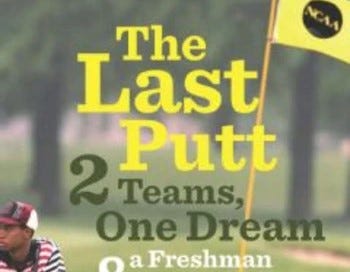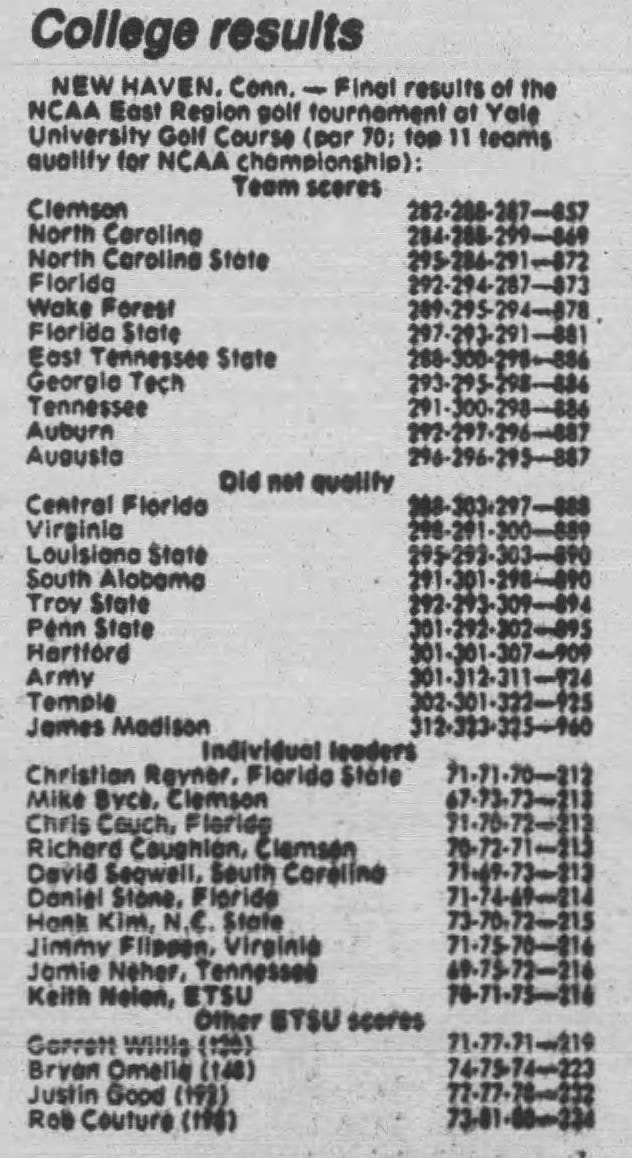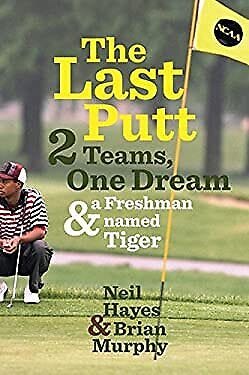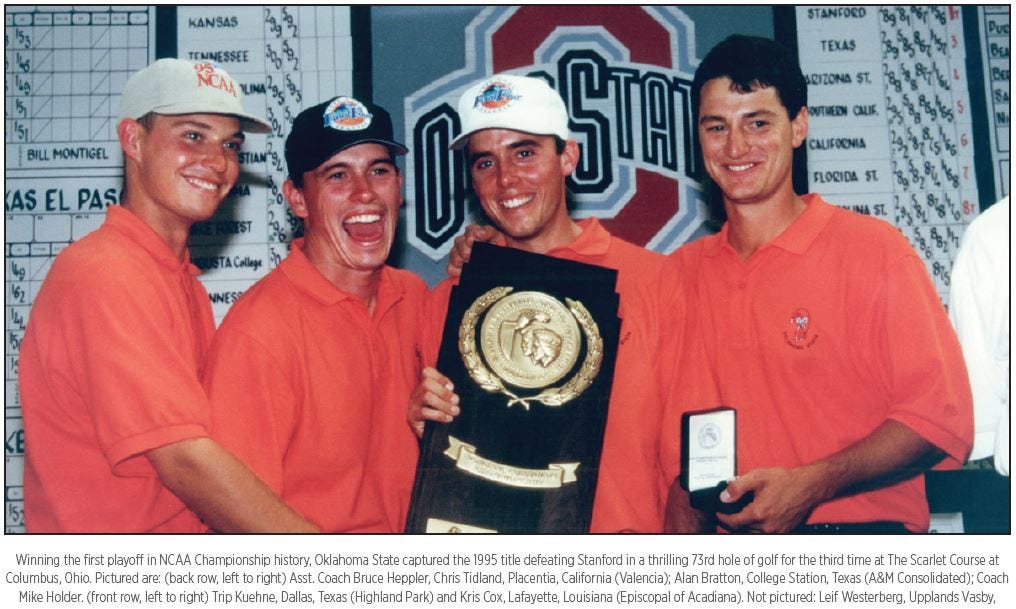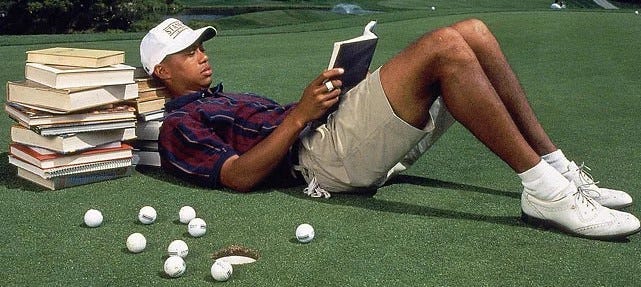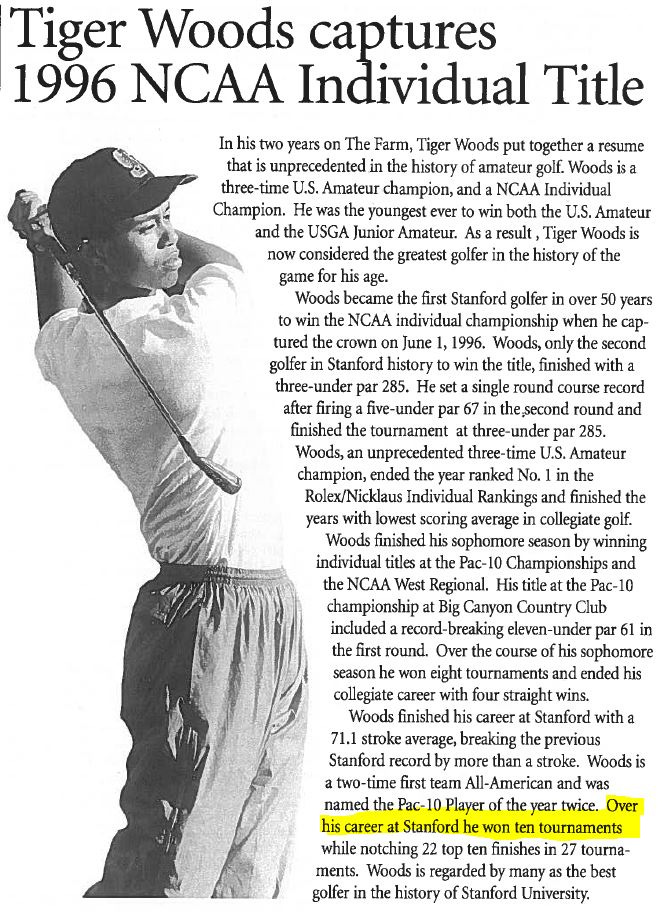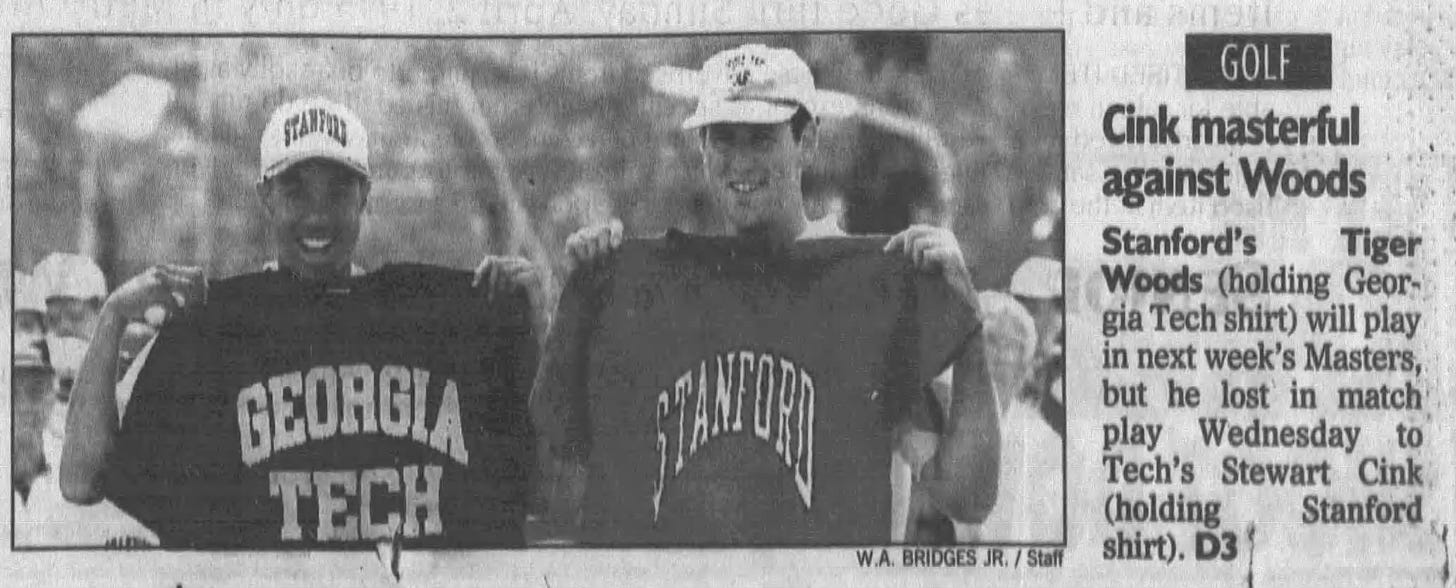This is part of a series on the Men’s Collegiate Championships
NCAA Championship Era: 1939-NOW
REGIONAL ROUND-UP
WEST REGIONAL
The most surprising result in this regional was that Stanford did not contend for the team or individual title, but that was because they were too busy trying to deal with food poisoning that nearly knocked them out of contention altogether. If Tiger Woods hadn’t been able to play at all, they would not have been able to post a 4th score and would have been DQ’d, missing the NCAA championship entirely!
CENTRAL REGIONAL
Oklahoma got the better of rival Oklahoma State, but the real showdown happened for the 10th and final team spot where TCU defeated Northwestern in a one-hole playoff. On the individual side, future Oklahoma State coaches Alan Bratton and Donnie Darr finished 1-2, a fact that surely has never once been brought up again.
EAST REGIONAL
Clemson outshines the rest of the field at the historic Yale Golf Course. Auburn and Augusta barely beat out UCF for the final spot, which is the only way that Auburn’s Chip Spratlin - who finished 63rd in regional play - was able to make the NCAA championship field.
Intercollegiate Championship #98: May 31 - June 3, 1995
Note that most of the details for this championship can be found in the wonderful book The Last Putt by Neil Hayes and Brian Murphy. We highly recommend every college golf fan check it out as it gives a very comprehensive (and entertaining!) look into not only the 1995 championship itself, but also so much more including the backstory on coaches Mike Holder and Wally Goodwin, the players involved for both Oklahoma State and Stanford, and the key details for the seasons prior to this championship.
Host: Ohio State University Scarlet Course
Hosts for the 9th time. The last two times that this course hosted the NCAA championships - 1980 and 1987 - Coach Mike Holder’s Oklahoma State Cowboys came away with the team title.
Format
Team and Individual stroke play
Day 1 = 18 holes
Day 2 = 18 holes
**Cut to top 15 teams as well as those within 18 strokes
**Cut to individuals on teams which made the cut as well as the top 5 individuals not on those teams
NOTE: due to weather delays the second round was not completed, therefore the cut was not completed until the following morning
Day 3 = 18 holes
Day 4 = 18 holes
**72 holes determines Team and Individual championships
Results
Individual Medalist/Champ: Chip Spratlin [Auburn]
This was supposed to be Tiger’s championship. College golf was seeing something it hadn’t in a long time, if ever, with the crowds of people coming in droves to see a freshman play golf, hoping for that historic championship. Instead, they saw a frustrated Woods break a wedge against his bag - for which he received a warning that would mean a 2-stroke penalty if any other behavior needing another “warning” was needed - on his way towards a first round 73. The surprise first round leader turned out to be an Auburn senior named Chip Spratlin who, as a former walk on who had worked hard to earn a partial scholarship and whose only win was a country club championship, was in many ways the opposite of Tiger. Through two rounds, another player who seemed “destined” to win the title - Oklahoma State’s Chris Tidland - challenged Spratlin as the two shared the lead at 138. The Auburn Tiger had regained the lead with a third round 70 while Tidland posted a 72. Spratlin described himself up to this point as cool and not too nervous, however as he reached the 15th hole in the final round with a 4 shot lead, the nerves seemed to finally hit. A double-bogey on 15 and bogey on 17 meant the lead was down to 1 as he reached the final hole. Amidst all of the crazy things happening on the team side that had stolen most people’s attention, the lone Auburn player left in the field collected himself and put his drive in the fairway, his approach on the green, and finished the easy two-putt from 15 feet to maintain the one-stroke lead over Tidland and Ted Purdy [Arizona]. In the end it was the Tiger from Auburn rather than California who took home the individual title. In April 2022, Spratlin was inducted into Auburn’s Walk of Fame, where he will forever live in infamy, more than simply an answer to a sports trivia question.
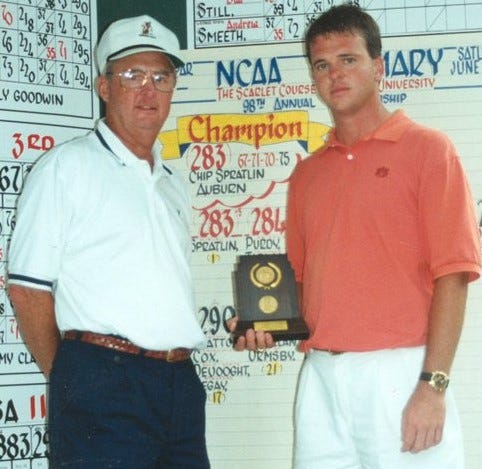
(via Auburn Athletics) Team Champ: *Oklahoma State (8 NCAA, 8 overall)
The first round on Wednesday went about as expected, teams that got out to an early lead included Arizona State, Florida State, Stanford, Texas, Oklahoma State, Tulsa, and Cal were all within 5 shots of each other. A Thursday morning thunderstorm, however, brought with it a downpour that changed the nature of the tournament in a few ways: soaking the course and delaying the round by several hours which meant that all teams were not able to complete their second round before darkness fell. The remaining 9 teams had to come out early Friday to settle the cutline and determine which 15 teams were ultimately able to proceed with the third round through the rest of the morning and afternoon. One of those teams that fell on the wrong side of the cut was Georgia Tech, leaving one of the tournament favorites, Stewart Cink, out of the running. The wet, windy weather continued through Friday, leaving last year’s champion (Stanford) and runner-up (Texas) tied for the lead, USC two shot back, and Oklahoma State only 3 shots away. The final round began amidst the threat of more bad weather which finally reached the course right around noon, forcing another long delay. This was the debut of the fancy electronic scoreboards at an NCAA golf championship, but they proved to be little more than props serving wrong/misleading info as teams and tournament officials struggled to find where everyone stood during the delay. Finally it was determined that Stanford and Texas were still tied with 9 holes to play for most of their players, while USC (9 holes left), Arizona State (5 left), and Oklahoma State (5 left) were all 8 strokes behind. After a two hour delay, play resumed but was again called to a halt just 25 minutes later. The time on course was just enough for Oklahoma State’s Leif Westerberg to finish his round, but now he and Coach Holder had a decision to make with regard to his scheduled flight to leave for the (British) Amateur Championship. With Texas two up on Stanford and Oklahoma State still 9 shots back, it didn’t seem like there was any reason to worry about keeping Westerberg around for a potential playoff that had never happened before, so Holder sent his player off to make his flight without much concern. After about 45 minutes sitting around thinking about the final few holes that separated them from the championship, the teams duck-walked around standing water all over the course out to their respect spots to resume play. The final hours of play were chaotic with teams all trying to figure out where they stood, but one thing became clear: Oklahoma State had posted some good numbers coming in while leaders Texas and Stanford were bleeding strokes. With a missed birdie putt under five feet for Notah Begay on the 18th that would have given Stanford a one stroke advantage over Oklahoma State, the championship came down to his teammate Tiger Woods who had his own ~20 foot birdie putt to make Stanford repeat champions. Tiger’s putt fell just short, stunning the crowd who had just witnessed the first team tie since Stanford and LSU shared the championship in 1942. This time, however, the NCAA had a tie-breaker scenario in place. The two teams gathered around the 18th hole just as Westerberg’s flight took off, leaving Oklahoma State a man short for a truly historic playoff.
THE PLAYOFF
The following excerpt is from a 1995 Sports Illustrated article on the championship by Rick Lipsey:
The playoff format called for each team to send its five players out for one hole -- it would be the 18th -- of sudden death, with the best four scores counting. Here, the Cowboys were at a disadvantage because they had only four men who could play. Sophomore Leif Westerberg had hurriedly left after finishing the fourth round to fly to England for the British Amateur, which was scheduled to begin on Monday in Hoylake. “We had made the travel plans in early April,” said Mike Holder, the Oklahoma State coach, “so I had no regrets about being in that position.”
In the playoff Stanford made four pars and a bogey, which wasn't counted, while Oklahoma State had two pars and two birdies. Kris Cox, a junior, nailed a 10-footer for the first birdie, and then Bratton canned a 35-footer for the second. “This is all a tribute to the way Coach handles us,” said Kuehne. “Lots of people say he runs a boot camp. But we love it, and we're great friends. What he makes us do allowed us to conquer all the odds.”
It also kept a few streaks alive. Holder-coached Cowboy teams
had won six previous NCAA championships, including the last two, in 1980 and '87, held at the Scarlet Course. And more important to the players, every golfer who has played four years under Holder since he started coaching at Oklahoma State in '73 has left Stillwater with at least one NCAA crown. “We desperately wanted to get Alan Bratton and Chris Tidland their titles,” said Cox.
During the victory celebration someone asked Kuehne to pinpoint what had been the difference for the Cowboys. “Last night an anonymous person left notes on the doors to two of our rooms at the hotel,” he said. “One said, 'If you don't believe you can do it, you never will. Believe in yourselves. Believe in destiny.' The other just said, 'Believe in destiny,' which I wrote on my golf balls today. Obviously, it was our destiny today. We had a perfect ending to a perfect season.”
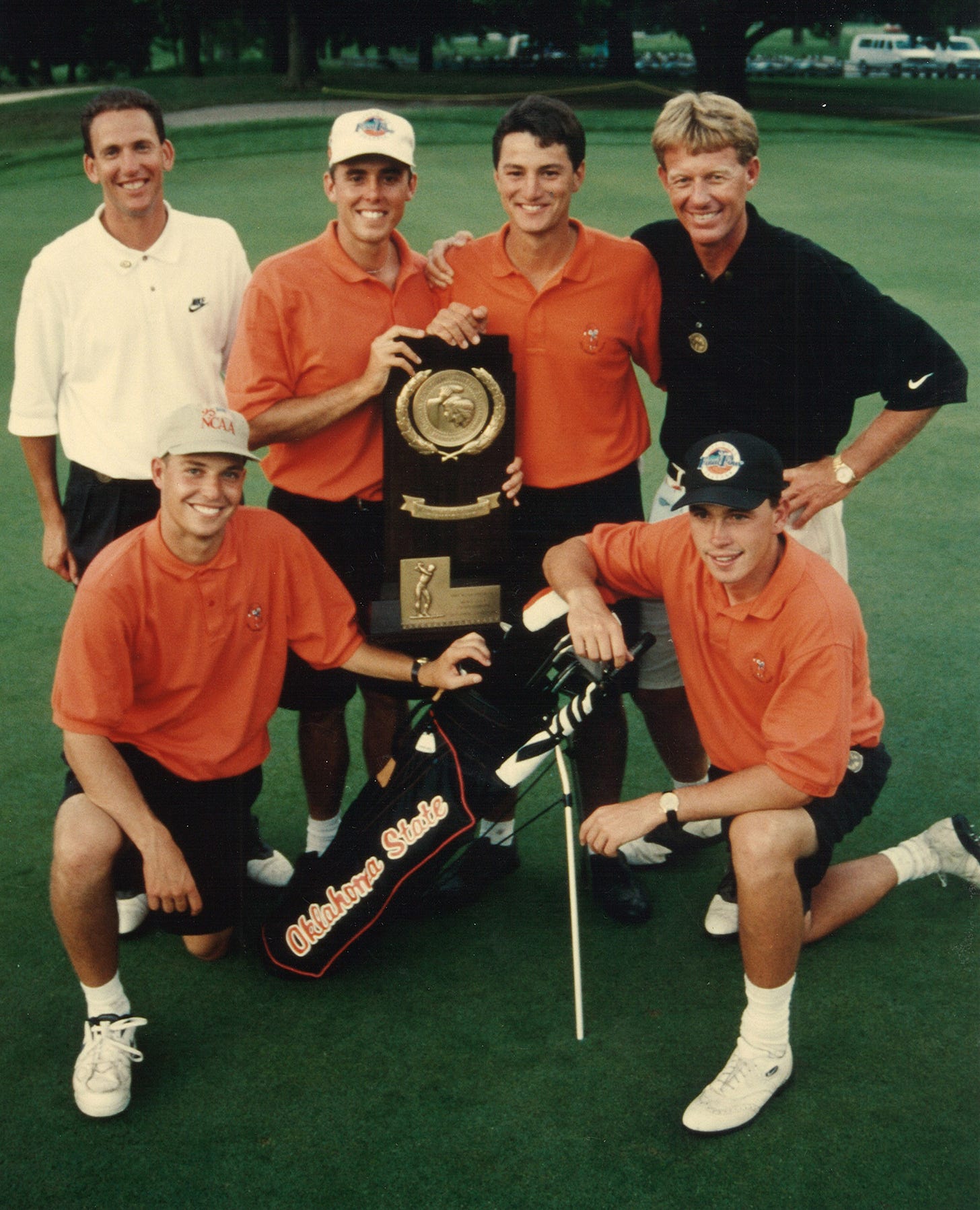
COACHES CORNER: Players Turned Coaches
Interesting to note the future coaches that played in this championship including: Alan Bratton [Oklahoma State], Donnie Darr [Ok St assistant, former Ohio State head coach], Conrad Ray [Stanford], Casey Martin [Oregon], Chris Riley [San Diego], Press McPhaul [NC State], Ryan Murphy [Texas women], Rob Bradley [Purdue], Nick Clinard [Auburn], Joey Maxon [Clemson assistant], Chad Wright [VCCC], and Kit Grove [former Kansas head coach]. The college golf coaching tree is a fascinating one that we hope to share someday, as soon as we figure out the right format to properly display it.
EXTRA HOLES: Tiger Woods’s Collegiate Career
There is perhaps no golfer in history who has been written about more than Tiger Woods, however a majority of his collegiate career is largely unknown to even his biggest fans. Most people know about his incredible run of USGA championships starting with the three US Junior Amateurs (1991-93) followed by the three US Amateur titles (1994-96, the last of which came in his second/final year of college), and many know that he won and individual NCAA title in 1996, but relatively few seem to know or remember just how close he and the Stanford team came to winning the 1995 title as covered above. If we were to take a poll, we believe most people might not know - but likely would not be shocked to learn - that he set a (then) NCAA record low 18 hole score with the 61 he shot in the 1996 PAC-10 Championship, or that in his two years he set the Stanford team record with 11 individual titles in only **26 events (more on this in a minute!). The latter fact gets even more interesting with the dual realizations that it has since been equaled twice on the men’s side by players who played one (Patrick Rodgers, 35 events) and two (Maverick McNealy, 45 events) more seasons than Tiger, as well as the fact that Tiger had an individuals-only title at the All American Sun Bowl that didn’t count towards his total.
Inconsistency In Tournament Data
Although it seems like a straightforward task given all the coverage Tiger generated while at Stanford, things get a little confusing when trying to dive into his tournament data over those two years. We’ll do our best to highlight all of the inconsistencies from the various sources and speculate on what we think caused these.
The most commonly cited source on Tiger Woods’ Stanford results is from the absolutely wonderful treasure trove that is StanfordMensGolf.com. This website, organized and maintained using volunteer help according to the main page, has an incredible amount of stats and info that spans practically the entire existence of the (men’s) sport at Stanford. On their page dedicated to Tiger, the following graphic appears near a picture of the 1994-95 team beneath a small writeup of Tiger’s accomplishments:
On the surface this seems like the perfect summary of Tiger’s collegiate career stats including a breakdown of tournaments and even rounds played each season, scoring average, average vs par, etc. Aside from not having the individual tournaments listed, what’s the problem?
For starters, they have Tiger with 3 wins during the 1994-95 season. Reading through the book mentioned above (The Last Putt) and various newspaper sources, this author was able to reconstruct the collection of tournament data which matches table seen above in all details except the number of wins. It seems that this total includes Tiger’s co-medalist finish at the Big Island Intercollegiate in Feb 1995 where he lost a playoff to Arizona State’s Chris Hanell.
The 1995-96 data has its own interesting problem which is somewhat tied to that from the first season. Using the data from the 1996-97 Stanford golf media guide (which we’ll get to in a second) we can again get a matching dataset **if we don’t include the small 3-team 36-hole event called “The Brawl”. Taking out this event, however, drops Tiger’s medalist count for the year to 7; HOWEVER this can be brought back up to 8 if we include the co-medalist finish at the Golf World (Palmetto Dunes) Collegiate where Tiger again lost in a playoff, this time to Oklahoma’s Grant Masson.
So what does Stanford’s official records have to say about this? Although we haven’t been able to get official response back from Stanford, the 1996-97 golf media guide - archived by StanfordMensGolf here - has a great breakdown of the entire 1995-96 season (pictured in the next section) as well as this interesting blub which has Tiger listed with **10 wins in 27 events
The number of events (27) includes the 13 from the 1994-95 season and 14 from the 1995-96 season, all of which can be verified by outside sources such as newspaper clippings and archived GolfStat results except The Brawl. It would seem that this event was official despite the fact that only 2 of the 3 teams completed all 36 holes of strokeplay, but it does not appear that it was used by GolfStat in computing the first ever Golfstat Cup Rankings, which Tiger won with 8 wins over 13 events. Over the years Golfstat has consistently credited players with wins when they co-medal even if those events were later decided by a playoff, so this makes it consistent with the StanfordMensGolf website (including in number of rounds, scoring average, and average to par). The Stanford media guide lists Tiger’s co-medalist finish at the Golf World Collegiate as a 2nd place finish, so their 10 total wins comes from all **solo medalist finishes (2 in the 1994-95 season, 8 in 1995-96 including The Brawl).
What does the NCAA’s official position? Although they don’t seem to have many records saved outside of the NCAA championship, there is a page dedicated to Tiger’s collegiate career. On that page the following section lists out his collegiate victories:

Although they don’t have dates, they clearly show that they don’t include the co-medalist “wins” from either event mentioned previously. Since the 1995 Stanford Invitational occurred during the 1995-96 season, the NCAA - which has been cited by countless articles since this page was created - has 2 victories listed in the 1994-95 season and **9 in the 1995-96 season in order to get up to the 11 win total. How can this be?? Well it would appear that they have something additional called the “Tri-Match” which very clearly seems to be another name for (and therefore a double counting of) “The Brawl”.
The Tournaments
Given all of the above, we are taking it on (current) fact that Tiger played in 27 official tournaments which resulted in the following:
Solo medalist in 10 events (37%)
Medalist/Co-Medalist in 12 (44%)
Finished first or second in 16 (59%)
Finished Top 5 in 20 (74%)
Finished Top 10 in 22 (81%)
Finished outside the Top 10 in only 4 (15%)
Withdrew from 1 event
Here is a breakdown of the 27 collegiate team tournaments Tiger played in while at Stanford, the 3 collegiate tournaments he missed, and the 1 individual-only collegiate tournament:
1994-95 Season
William H Tucker Intercollegiate = Medalist
Score of 208 was 3 strokes better than Alan Bratton [Oklahoma State]
Team title won by Oklahoma State, Stanford = 8th
Golfweek/Ping Preview (at Scarlet Course) = T4
Final round cancelled by rain
Stewart Cink [Georgia Tech] won with 140
Casey Martin [Stanford] and Chris Riley [UNLV] T2 with 142
Tiger and three other players T4 at 143
Team title won by Stanford
Topy Cup in Japan = DID NOT PLAY
Was playing in the World Amateur Team Championship in France
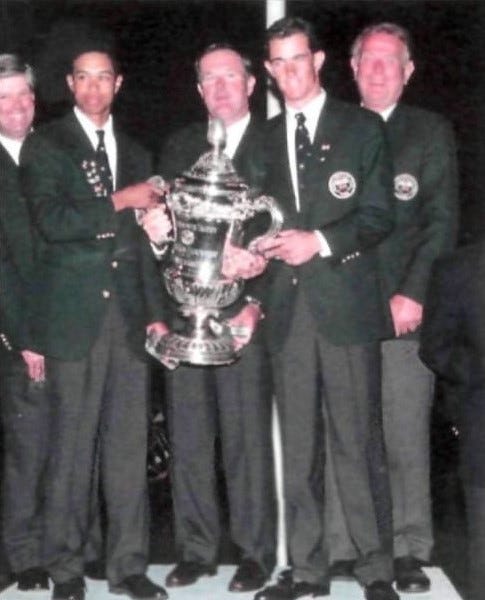
1994 US Team that won the Eisenhower Trophy (via Sports Illustrated) Chris Riley [UNLV] won individual
Team title won by UNLV, Stanford = 3rd
Jerry Pate Intercollegiate = Medalist
Score of 206 was 2 better than teammate Yanagisawa
Team title won by Stanford
Golf World/Palmetto Dunes = T13
Chris Tidland [Oklahoma St] won individual title over Stewart Cink [Georgia Tech]
Tiger shoots final round 80 to finish 8 shots back at 216
Oklahoma State won team title, Stanford = 2nd
Taylor Made Big Island (now Amer Ari) Intercollegiate = T1 *lost in playoff
Tied with Chris Hanell [Arizona State] at 207
Hanell sank birdie putt on 2nd playoff hole to Tiger’s par
Team title won by Oklahoma State, Stanford = 3rd
John Burns Intercollegiate = T9
Notah Begay [Stanford] won individual with 140 over Kris Cox [Ok State], Tim Beans [Arizona], and Mike Saver [New Mexico] at 141
Tiger tied with 3 others just 3 strokes back at 143
Team title won by Oklahoma State, Stanford = 3rd
Oregon Duck Invitational = 4th
Notah Begay’s 138 was 3 shots clear of Steve Woods [San Jose St] and 7 ahead of Tiger
Team title won by Stanford
Southwestern Intercollegiate = T2
Mike Walton [Pepperdine] won with 216 which was 3 better than a stellar group that included Tiger, Arron Oberholser [San Jose St], Todd Demsey [Arizona State], Jon Bettencourt [Fresno St], and Ted Snavely [Oregon]
Team title won by Stanford
Carpet Capital Collegiate = 2nd
Stewart Cink (212) betters Tiger by 4 strokes
Team title won by Georgia Tech, Stanford = 2nd
Stanford and Georgia Tech played an unofficial match ahead of the tournament with Stewart Cink getting the better of Tiger in their match
Sun Devil/Thunderbird Classic = T12
Todd Demsey [Arizona State] (213) won by one stroke over Tag Ridling [Arkansas], Chris Tidland [Ok St], and Chris Hanell [Arizona St]
Tiger and group of 6 others were 7 shots back at 220
Team title won by Arkansas, Stanford = 6th
US Intercollegiate (hosted by Stanford) = WD
Tiger withdrew midway through the second round with a rotator cuff injury
Casey Martin [Stanford] won individual with 206, 3 strokes ahead of Charlie Wi [Cal]
Team title won by Stanford
PAC-10 Championship = DID NOT PLAY
Tiger was still recovering from his injured shoulder
Charlie Wi [Cal] (279) beats out Scott Johnson [Arizona St] by 5 strokes for the individual title
Arizona State wins the team title, Stanford = 8th
NCAA West Regional = T18
Mike Sauer [New Mexico] (208) outlasts Larry Barber [Arizona State] by a single stroke for the individual title
Arizona State wins the Regional title, Stanford = 6th
NCAA Championship = T5
Chip Spratlin [Auburn] hangs on for the individual title by a single stroke over Chris Tidland [Ok St] and Ted Purdy [Arizona], with Tiger only 3 strokes back
Oklahoma State and Stanford tied in regulation, but Ok St came away with the team title following a one-hole playoff
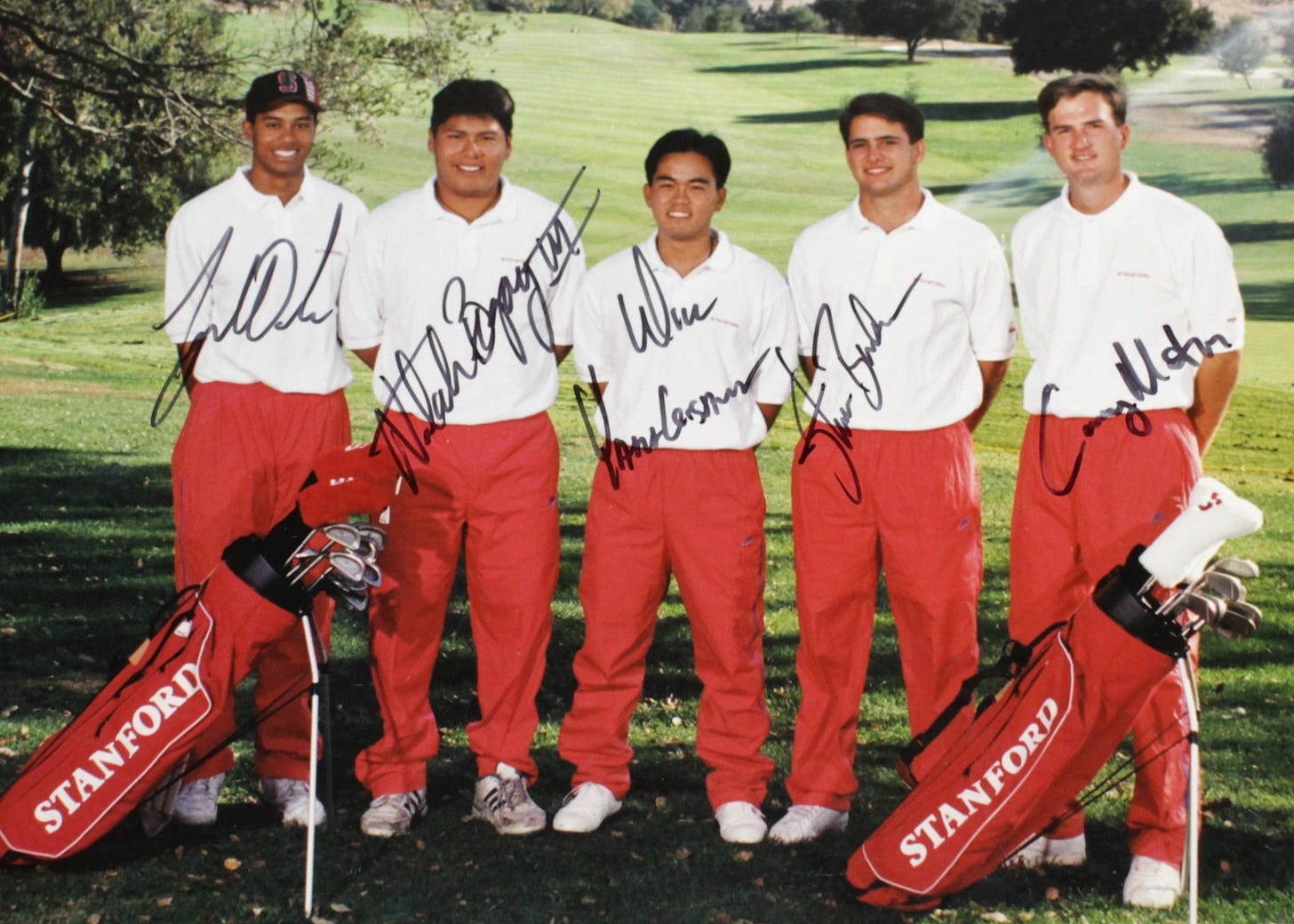
This signed photo of the 1994-95 Stanford team recently sold at auction for nearly $1k 1995-96 Season
Windon Memorial Classic = 2nd
Josh McCumberm [Florida] shoots 212 to outlast Tiger who shot a final round 67 to fall just 2 short
Florida wins the team title, Stanford = 2nd
**Savane/Sun Bowl All-America Golf Classic = T1 *won playoff
Tournament for individuals only so does not count towards his total
Won a one-hole playoff over Fredrik Soderstrom [Tulsa]
U of San Francisco Invitational = T6
Tag Riddings [Arkansas] shot 214 to win by 3, Tiger finished 7 strokes back
Pepperdine won the team title, Stanford = 6th
Stanford Invitational = Medalist
Tiger shoots a final round 68 to retain his one stroke lead over teammate Joel Kribel
Stanford wins the team title
Golf World/Palmetto Dunes = T1 *lost in playoff
Grant Masson [Oklahoma] sank two long putts to win in a playoff, first a bogey to tie in regulation then a birdie in the first playoff hole to win
ETSU wins the team title, Stanford = 12th
Ping Arizona Intercollegiate = 2nd
Ted Purdy [Arizona] (200) outduels Tiger (206) with a final round 65 to win by 6 strokes
Arizona wins the team title, Stanford = 2nd
John Burns Intercollegiate = Medalist
Tiger gets revenge over Grant Masson [Oklahoma] to win by 4
Auburn wins the team title, Stanford = 7th
Golf Digest Collegiate = T23
Chad Campbell [UNLV] wins by 1 over Robby Skinner [Texas], Tiger’s back to back 77s put him 10 strokes back
UNLV wins the team title, Stanford = T10
Southwestern Intercollegiate = Medalist
Tiger (213) wins by 3 over Joey Snyder [Arizona St]
Arizona State wins the team title, Stanford = T4
US Collegiate = 3rd
Arron Oberholser [San Jose St] wins by 3 over Joel Kribel [Stanford], Tiger was 6 strokes back
Stanford wins the team title
US Intercollegiate (hosted by Stanford) = DID NOT PLAY
Tiger was playing in the Masters (shot 75-75 to miss the cut by 4 strokes)
Joel Kribel [Stanford] wins by 2 over Matt Christensen [Fresno St]
Fresno St wins team title, Stanford = 5th
The Brawl / “Tri-Match” = Medalist
Tiger finished 4 shots ahead of teammates Joel Kribel and Jerry Chang
The only info on the event found so far is from Stanford’s 1996-97 media guide (see above)
**This is a three team 36-hole strokeplay event which counts towards Tiger’s collegiate win total, but is double counted on the NCAA website
Cougar Classic = Medalist
Tiger’s 75 on a day of high scores is good enough for a 3 shot win over Cam Osler [Colorado State]
Stanford won the team title
PAC-10 Championship = Medalist
Tiger’s record-setting 61 helps lead to 14 stroke victory over Birk Nelson [Oregon St] and Brian Hull [USC]
Arizona State wins the team title, Stanford = 4th
NCAA West Regional = Medalist
Tiger’s final round 67 opened up a 6 stroke victory over Mike Pavao [Hawaii]
Stanford wins the team title
NCAA Championship = Medalist
Tiger’s final round 80 was still good enough for a 4 shot victory over Rory Sabbatini [Arizona]
Arizona State won the team title, Stanford = 4th
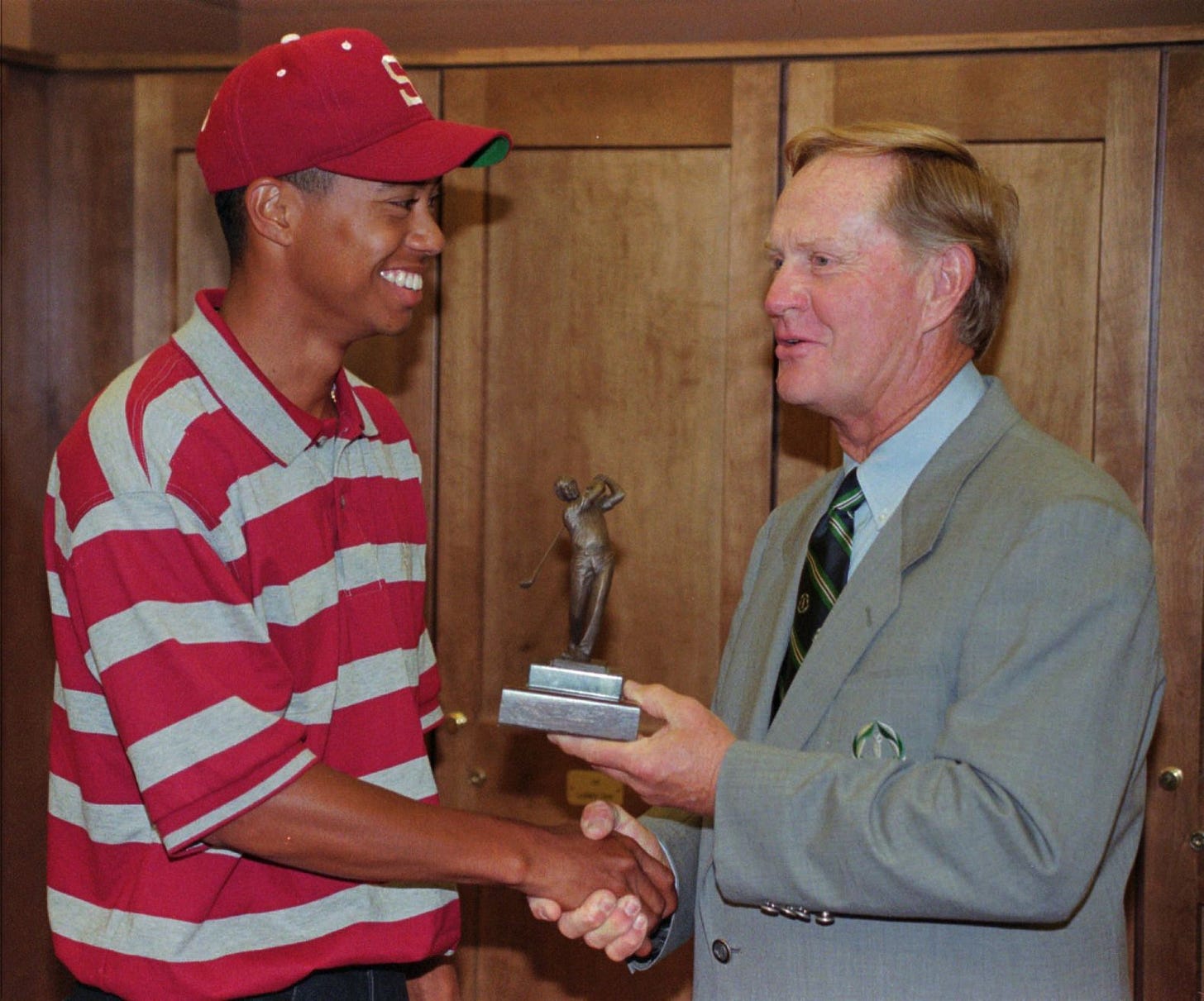
After his incredible sophomore season, Tiger was awarded several of the most prestigious college golf awards including: Jack Nicklaus Award, Arnold Palmer Award, and Fred Haskins Award. A few months later, Tiger would win his third straight US Amateur title shortly before officially saying goodbye to the college golf world and hello to the pro tour.
Thanks for reading!
Up Next:
In the next post we will cover the 2000 championship which just so happened to be the only other time the team championship was decided by a sudden-death playoff, with Oklahoma State again coming out on top. Also, it’s past time we dive into the incredible accomplishments of Coach Mike Holder.

